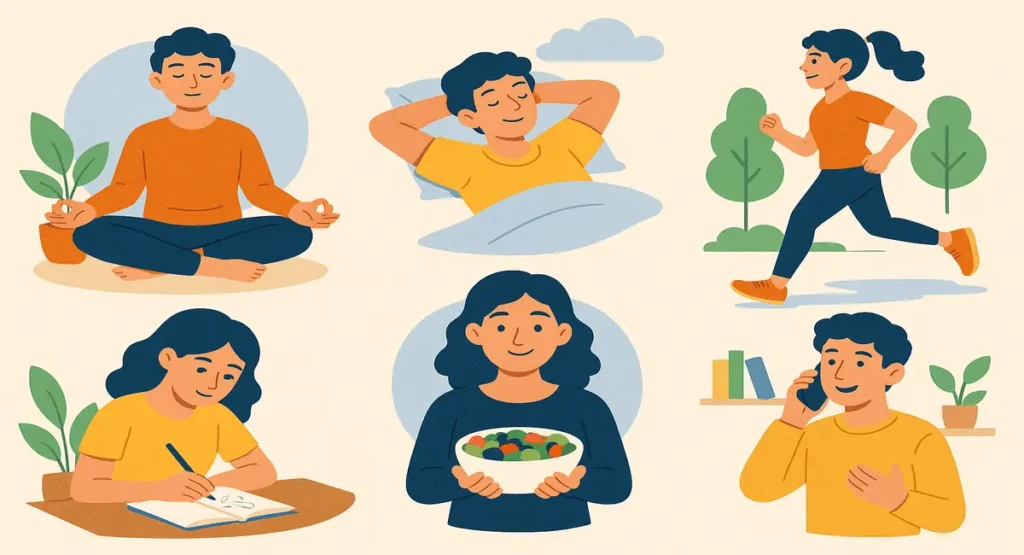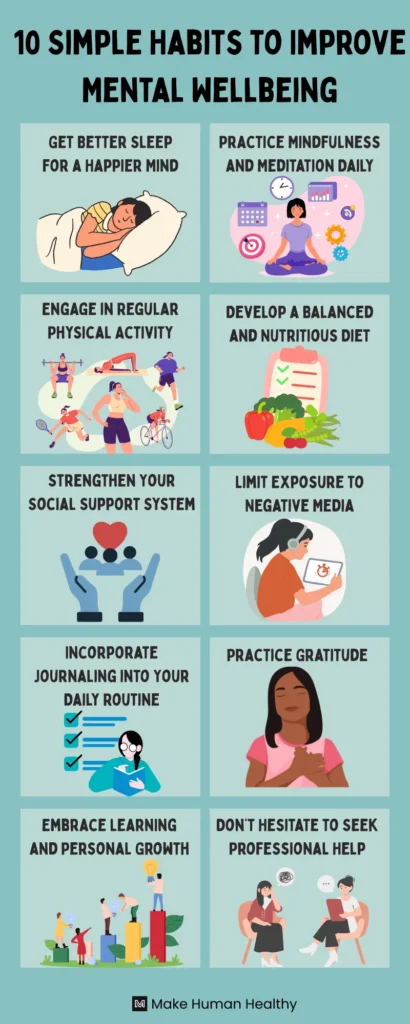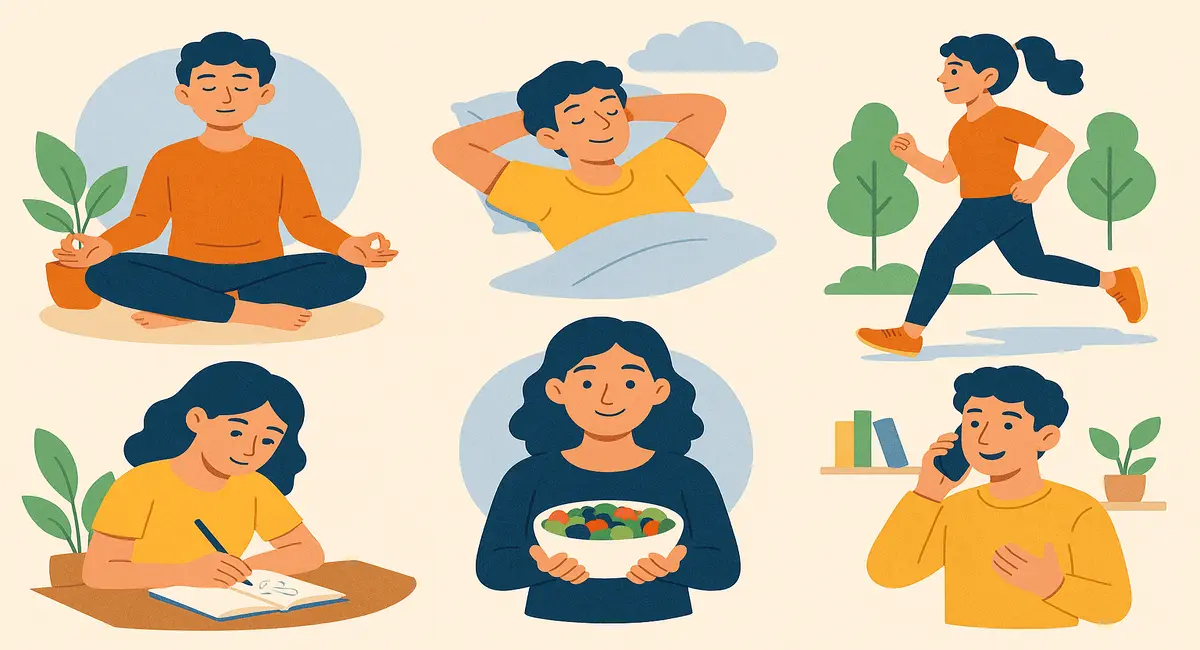Are you having trouble with stress, anxiety, or emotional exhaustion? You are not the only one. In today’s busy world, trying to balance work, family, and personal time can be bad for your mental health. Taking small steps every day can help you feel better if you have social anxiety, postpartum depression, or are just feeling emotionally drained.
This article explores 10 proven habits to improve mental well-being—backed by science and easy to follow. These daily practices are designed to help you reduce stress, boost your mood, and support long-term mental resilience. Let’s get started on the path to a healthier mind, one habit at a time.
Table of Contents
1. Get Better Sleep for a Happier Mind
Getting good, peaceful sleep regularly is one of the best things you can do to feel better mentally. When your body lacks proper rest, your brain struggles to reduce stress, regulate emotions, and stay focused. Not getting enough good sleep can make you more likely to feel anxious or down. You can help your mind feel calm, balanced, and emotionally strong by creating a healthy bedtime routine and getting 7 to 9 hours of sleep every night.
Why Sleep Matters for Mental Health?
Getting good sleep is essential for keeping your mind healthy and feeling your best. It gives your body time to heal and helps your brain sort through feelings and memories. When you don’t sleep well, it can lead to more stress and make you feel anxious or down.
Good sleep also helps balance hormones by lowering cortisol (the stress hormone) and boosting serotonin, which supports a stable and positive mood. Proper sleep and treating it as a top priority are two of the best things you can do to feel better mentally.
Tips to Improve Sleep Hygiene for Mental Wellbeing
- Set a Regular Schedule: It is important to maintain a consistent sleep pattern by going to bed and waking up at the same time every day, even on the weekends.
- Create a Relaxing Environment: In order to help you relax, turn down the lights, lower the noise, and make your bed comfortable.
- Reduce Screen Exposure: To sleep better, turn off all digital devices at least an hour before bed. The blue light from your phone and computer can interfere with your sleep.
Bonus Tips: Struggling to get quality sleep despite trying everything? Discover The Genuine Wave—a revolutionary approach to calming your mind and improving sleep naturally. Click here to learn more and transform your nights.

2. Practice Mindfulness and Meditation Daily
Mindfulness isn’t just a trendy buzzword—it’s a powerful tool that helps you stay present, manage emotions, and reduce stress. Studies show that mindfulness-based practices, like cognitive behavior therapy (CBT), can help people struggling with anxiety disorders.
How Mindfulness Helps?
Taking a moment to practice mindfulness can help you feel calmer and more at ease by easing stress and calming anxious thoughts. Meditation techniques keep you grounded and quiet the constant mental noise that often triggers anxious thoughts.
It also boosts self-awareness. With regular mindfulness practice, you become better at spotting negative thought patterns and gently shifting them toward more positive, helpful thinking.
Mindfulness Meditation Techniques for Social Anxiety
- Short Daily Sessions: Start with just 5 to 10 minutes a day, and as you get more comfortable, slowly add more time to your practice.
- Apps for Guided Meditation: You might want to try apps like Headspace or Calm for guided sessions.
- Breathing Techniques: To calm your mind and body, focus on deep breathing exercises.
Bonus Tips: Mindfulness is powerful, but what if you could amplify its effects? The Genuine Wave combines mindfulness techniques with cutting-edge strategies to help you achieve more profound relaxation and mental clarity. Explore how it works today!
3. Engage in Regular Physical Activity
Regular exercise is one of the most effective habits to improve mental health. It boosts your mood by releasing endorphins—natural chemicals that help reduce stress and make you feel happier. Taking even a quick walk every day can help your health.
The Mental Benefits of Exercise
Exercise is an effective way to help ease stress. It helps lower cortisol—the body’s primary stress hormone—which can reduce feelings of anxiety and depression. Staying active also sharpens your mind. Regular physical activity improves brain function, supporting better memory, focus, and decision-making.
Working out with a group or playing a team sport can help your mental health by connecting you with other people. It’s a great way to meet new people and feel less alone or anxious about being around other people.
Tips for Incorporating Exercise
- Start Small: Start with easy activities, such as walking, cycling, or yoga.
- Schedule Your Workouts: Plan your exercise sessions as you would a meeting to ensure consistency.
- Mix It Up: Mix up your routine by adding strength training, cardio, and flexibility exercises for a more balanced approach.
Bonus Tips: Incorporate short bursts of activity, like a 10-minute walk or stretching breaks, throughout your day to keep your energy and mood elevated.
4. Develop a Balanced and Nutritious Diet
Food is an important part of keeping your mind healthy. Focusing on whole foods, lean proteins, and healthy fats in your diet is a good way to improve your mental health naturally. It fuels your brain, gives you more energy, and helps you stay emotionally stable.
Nutrition and Mental Wellbeing
Foods rich in omega-3 fatty acids—like fish, walnuts, and flaxseeds—are great for brain health. They help support memory, focus, and emotional stability.
Eating balanced meals regularly helps keep your blood sugar levels steady. This prevents sudden energy crashes that can trigger mood swings, irritability, and anxiety.
Your gut health plays a significant role in your overall mental well-being. Since the gut produces much of the body’s serotonin, taking care of your digestive health can naturally boost your mood and overall mental well-being.
Dietary Tips for Better Mental Health
- Plan Your Meals: Plan your meals for the week with a good mix of fruits, vegetables, and lean proteins.
- Stay Hydrated: If you’re not drinking enough water, it can leave you feeling drained and irritable, so be sure to keep yourself hydrated all day long.
- Avoid Processed Foods: Snacks and foods that are high in sugar can make you tired and irritable, so limit your intake.
Bonus Tips: For a quick dose of healthy fats and magnesium that help your brain work better and lower stress, add a few nuts or seeds to your meals.
5. Strengthen Your Social Support System
Building strong relationships is one of the best things you can do for your mental health. Talking to friends or family you trust can make you feel better, less lonely, and better able to handle hard times. A strong support system can help you feel better emotionally and build resilience.
The Importance of Social Connections
Strong social ties can help you get through tough times by giving you emotional support. Sharing your feelings with a friend, family member, or a support group can make a big difference for your mental well-being.
Spending time with others also helps reduce loneliness. Regular social interaction creates a sense of belonging, which is especially helpful for those experiencing anxiety, depression, or emotional stress.
Positive social experiences can boost your self-esteem. Feeling valued and understood by others helps build confidence and encourages a more optimistic view of life, both essential habits to improve mental well-being over time.

How to Strengthen Your Social Network
- Stay in touch: Make time to talk to friends and family on a regular basis, even if it’s just a short call or message.
- Join Local Groups: Look for classes, clubs, or support groups that are interested in the same things you are.
- Volunteer: Volunteering is a great way to meet new people and make a real difference in your community.
Bonus Tips: Even if it’s just a short text or call, make sure to check in with family and friends on a regular basis. People can feel less alone and their connections can get stronger when they do small acts of kindness.
6. Limit Exposure to Negative Media
Constantly being surrounded by negative news and social media can really impact your mental health over time. It can heighten stress, anxiety, and feelings of hopelessness. One of the most effective
The Impact of Negative Media
Reading upsetting news all the time can make you more stressed and anxious. It’s harder to relax and stay emotionally balanced when your mind is full of bad news.
Too much negative media can also change how you see the world. It might make you more afraid or negative, which makes it hard to stay hopeful or motivated.
It can be hard to sleep if you look at social media or watch bad news before bed. It’s bad for your mental health to watch TV or play video games at night because they keep your mind busy and make you stressed, which makes it hard to fall asleep and stay asleep.
How to Detox from Negative Media:
- Set Limits on Time: Set aside certain times of the day to look at the news and social media.
- Make Your Feed Unique: Follow people who talk about mental health and happiness.
- Digital Detox: Take breaks from screens every now and then to reconnect with the world around you and do things that don’t involve screens.
Bonus Tips: Replace negative media with uplifting podcasts or audiobooks during your downtime. This shift can help you stay informed without feeling drained.
7. Incorporate Journaling into Your Daily Routine
Writing in a journal is a simple and useful way to improve your mental and emotional health. Writing down your thoughts every day can help you understand how you feel, lower your stress, and help with mental health treatments like cognitive behavioral therapy. It’s good for people who are dealing with anxiety, depression, or too many emotions.
Benefits of Journaling
Journaling can be a great way to help your emotions straight by letting you think about and understand your thoughts on paper. You can learn to deal with strong emotions and become more aware of your feelings by doing this simple thing.
Writing on a regular basis can help you deal with stress. It gives you a safe place to say what you think, which can help you feel more relaxed and empowered.
Every day, writing in a journal can help you remember how you feel and why you feel that way. This can help you deal with social anxiety, learn more about yourself, and keep your mental health in good shape for a long time.
Journaling Techniques to Overcome Anxiety
- Make Time: Spend a few minutes each day writing about your thoughts, feelings, and experiences.
- Use Prompts: Use prompts like “What am I thankful for today?” or “What problems did I solve?” if you don’t know where to start.
- Keep It Private: Your journal is a safe space for honest reflection, so don’t worry about grammar or style.
Bonus Tips: Pair your gratitude practice with a morning routine. Reflecting on what you’re thankful for as how you begin your day can shape your mood and energy for the hours to come.
8. Practice Gratitude
Being thankful is a great way to improve your mental health. Taking time to think about what you’re grateful for can help you get your mind off of stress and negativity, which can improve your emotional health and give you a more positive view of life.
The Science Behind Gratitude
A simple way to feel better and improve your mental health is to make gratitude a part of your daily life. Studies show that concentrating on the good things in life can help you feel more emotionally stable and lessen the signs of depression.
Gratitude also strengthens relationships. Taking the time to express appreciation deepens connections and creates more positive, supportive interactions with the people around you.
By lowering cortisol—the body’s primary stress hormone—gratitude contributes to a calmer and more relaxed mental state. This makes it a simple yet powerful tool for reducing stress naturally.
Ways to Practice Gratitude Daily
- Gratitude Journals: Write down three things you’re grateful for each day.
- Verbal Affirmations: Take time to thank someone in your life for their support.
- Mindful Reflection: Take a few moments each day to focus on the positive experiences and blessings in your life.
Bonus Tips: To quickly organize your thoughts, write them down in bullet points or lists. This method makes journaling less scary and more useful.
9. Embrace Learning and Personal Growth
Accepting that you can grow as a person is one of the best things you can do for your mental health. Being curious keeps your mind sharp and active. You can do this by learning something new, reading something interesting, or doing a hobby. This ongoing learning helps you feel more fulfilled in your daily life, boosts your confidence, and supports your emotional health.
Why Personal Growth Matters
Exploring new hobbies or gaining new knowledge helps keep your brain sharp and engaged. This kind of mental stimulation improves cognitive function, strengthens resilience, and supports long-term mental clarity.
Personal growth helps you feel proud of yourself and gives a clear sense of accomplishment. Picking up a new skill or learning something fresh can make you feel more confident and help lessen self-doubt.
Focusing on personal growth helps you become better at solving problems. It enables you to view challenges from different angles and find healthier, more effective ways to cope with stress.
Ways to Help Yourself Grow
- Make sure your goals are realistic: Find specific things you want to get better at and set small goals that you can reach.
- Make a Plan for Learning: Set aside time each week for things that make you think, like reading or taking online courses.
- Be a part of communities: Join a group in your area or online where you can talk about what you’re learning and get help.
Bonus Tips: Every day, celebrate small wins, like getting through a hard time or learning something new. Keeping a growth-oriented mindset is easier when you notice progress.
10. Don’t Hesitate to Seek Professional Help
Sometimes, self-care isn’t enough, and that’s okay. If you’re struggling with persistent social anxiety, postpartum depression, or severe stress, seeking help from a mental health professional is a smart move.
When to Seek Professional Help?
If you’ve been dealing with ongoing anxiety, depression, or stress that doesn’t improve with lifestyle changes, it’s essential to seek professional help. Ongoing symptoms could be a sign of more serious mental health issues that require professional attention.
During a mental health crisis or periods of severe emotional distress, reaching out to a therapist or counselor is essential. Getting support right away can really help in stabilizing your well-being.
Mental health professionals offer personalized care based on your unique needs. They can help you come up with good ways to deal with problems and make a treatment plan that works for you by using evidence-based methods like cognitive behavioral therapy (CBT).
How to Choose a Mental Health Professional?
- Research Credentials: Look for therapists with appropriate certifications and positive reviews.
- Ask for Recommendations: Your primary care doctor, family, or friends can all give you referrals.
- Consider Accessibility: Think about how easy it is to get to the professional. Make sure they are close enough to you or offer online sessions if you can’t make it to their office.
Final Thoughts On Improving Mental Well-being
Making big changes overnight won’t help your mental health. Over time, small, regular actions like getting better sleep, being mindful, working out, and writing in a journal can make a big difference.
Taking care of your mental well-being is a journey, and every small step counts. Suppose you’re ready to take your progress to the next level. In that case, The Genuine Wave provides a holistic, science-backed approach to reducing anxiety and boosting happiness. Click here to learn more and start your transformation today!“
If you’re struggling with social anxiety, postpartum depression, or stress, start by adopting just one or two of these habits. Focus on progress rather than perfection and practise self-compassion.
Remember, your mental health matters, and you deserve to feel happy, confident, and at peace.
Souces
At Make Human Healthy, we are committed to providing accurate and reliable health information. We ensure that all content is backed by scientific research, peer-reviewed studies, and credible health organizations. Our resources are carefully selected to maintain the highest standards of integrity, transparency, and reliability, so you can trust the information we provide.
NHS:- 5 steps to mental wellbeing – https://www.nhs.uk/mental-health/self-help/guides-tools-and-activities/five-steps-to-mental-wellbeing/
Cambridge University Press:- The influence of physical activity on mental well-being – https://www.cambridge.org/core/journals/public-health-nutrition/article/influence-of-physical-activity-on-mental-wellbeing/3C363AEECE5C8CAC490A585BA29E6BF8
National Institute Of Mental Health:- Caring for Your Mental Health – https://www.nimh.nih.gov/health/topics/caring-for-your-mental-health
Healthline:- 8 Daily Habits to Boost Mental Health — and Signs It May Be Time to Get Support – https://www.healthline.com/health/mental-health/habits-to-improve-mental-health
American Heart Association:- Mental Health and Well-Being – https://www.heart.org/en/healthy-living/healthy-lifestyle/mental-health-and-wellbeing
HealthHub:- 10 Essential Tips for Mental Well-Being – https://www.healthhub.sg/live-healthy/10-essentials-for-mental-well-being
BetterUp:- What is mental well-being? 7 ways to improve your mental health – https://www.betterup.com/blog/what-is-mental-wellbeing-3-steps-to-boost-your-mental-health
NHS:- Mental wellbeing tips – https://www.nhs.uk/every-mind-matters/mental-wellbeing-tips/
Affiliate Disclosure: This post may contain affiliate links. If you make a purchase through these links, I may earn a small commission at no extra cost to you. This helps support the blog and allows me to continue creating helpful content. Thank you for your support!
This content is written by Dr. Arshi Thakur. If you found this content helpful, please consider sharing it on your social media to help others benefit from it!
Please note: Our website services, content, and products are for informational purposes only. Make Human Healthy does not provide medical advice, diagnosis, or treatment.

